Eutelsat Group Bundle
Can Eutelsat Group Conquer the Skies?
Eutelsat Group, a titan in Eutelsat Group SWOT Analysis, has boldly redefined its mission by merging with OneWeb, catapulting itself into the dynamic Low Earth Orbit (LEO) satellite internet arena. This strategic pivot positions Eutelsat as the first fully integrated GEO-LEO operator, a move that promises to reshape the competitive landscape of the Telecom Industry. Founded in 1977, Eutelsat's evolution from a regional player to a global force in Satellite Communications is a compelling narrative of strategic adaptation.
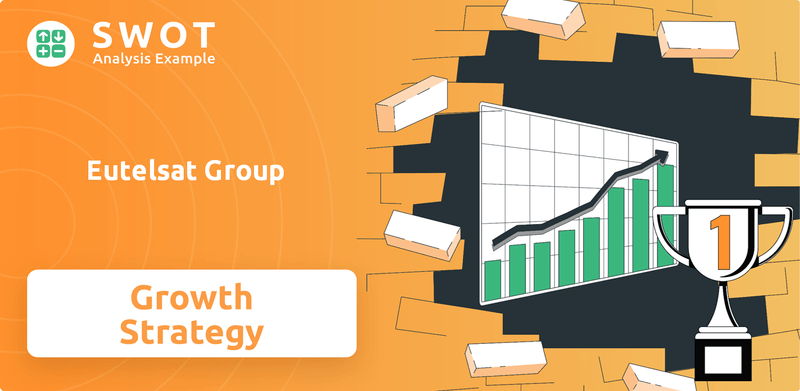
With over 600 LEO satellites and 35 geostationary satellites, Eutelsat Group's expansive infrastructure now serves over 1.5 billion people, fueling its Growth Strategy. This comprehensive analysis will delve into Eutelsat Future, exploring its expansion plans, technological advancements, and financial performance within the Space Technology sector. We'll examine the company's strategic initiatives and investment opportunities, considering both the challenges and opportunities that lie ahead in this rapidly evolving market, including Eutelsat Group revenue growth analysis and Eutelsat Group market share.
How Is Eutelsat Group Expanding Its Reach?
The Eutelsat Group's expansion strategy focuses on leveraging its combined GEO-LEO capabilities to enter new markets and diversify revenue streams. This approach is crucial for the company's long-term growth and its ability to compete in the evolving Satellite Communications landscape. The company aims to strengthen its position in the Telecom Industry through strategic investments and partnerships, ensuring it remains at the forefront of Space Technology.
A significant part of this strategy involves participating in the European Union's IRIS² multi-orbit constellation project. This initiative, valued at around €10.6 billion, is a key element of Eutelsat's expansion plans. The company's investment in IRIS² is expected to be around €2 billion, with substantial revenue generation anticipated over the concession period. This project is vital for expanding its low Earth orbit capacities and ensuring technological compatibility with its existing OneWeb constellation, which is critical for its Eutelsat Future.
To support the expansion of its LEO constellation, Eutelsat has already secured the first batch of 100 LEO satellites, with delivery expected by the end of 2026. The company anticipates needing an additional 340 satellites to extend the LEO constellation until IRIS² becomes operational. This investment, totaling between €2-2.2 billion, underscores its commitment to scaling its connectivity solutions and highlights the company's focus on Eutelsat Group revenue growth analysis.
Eutelsat's involvement in the IRIS² project is a cornerstone of its expansion strategy. The project is expected to generate at least €6.5 billion in revenues over the concession period. This project is a crucial element for expanding its low Earth orbit capacities and ensuring technological compatibility with its existing OneWeb constellation.
Eutelsat is investing heavily in its LEO constellation, with a total investment of €2-2.2 billion between FY 2024-25 and FY 2028-29. The procurement of 100 LEO satellites for delivery by the end of calendar year 2026 is a key milestone. The company is also focused on Eutelsat Group investment opportunities.
The company is actively expanding in Africa and the Middle East, expecting a revenue contribution of €200 million in 2024-2025. This expansion is part of Eutelsat's broader strategy to diversify its revenue streams and enhance its global presence. The company is also focused on Eutelsat Group global presence.
Eutelsat is forming strategic partnerships to improve operational efficiency and expand service offerings. The company's collaboration with United Group, as the single satellite operator for its next-generation DTH platform, is a prime example. This partnership extends services to 40 million people across eight countries in Southeastern Europe, which is a part of Eutelsat Group partnerships and collaborations.
Eutelsat's expansion strategy includes participation in the IRIS² project, significant investment in LEO satellites, and geographic expansion in Africa and the Middle East. These initiatives are designed to drive Eutelsat Group's Growth Strategy and maintain its competitive edge in the market. You can learn more about the company's values in this article: Mission, Vision & Core Values of Eutelsat Group.
- IRIS² project participation with a projected investment of €2 billion.
- Procurement of LEO satellites with a total investment of €2-2.2 billion.
- Expansion in Africa and the Middle East with an expected revenue contribution of €200 million.
- Strategic partnerships to improve operational efficiency and expand service offerings.
Eutelsat Group SWOT Analysis
- Complete SWOT Breakdown
- Fully Customizable
- Editable in Excel & Word
- Professional Formatting
- Investor-Ready Format
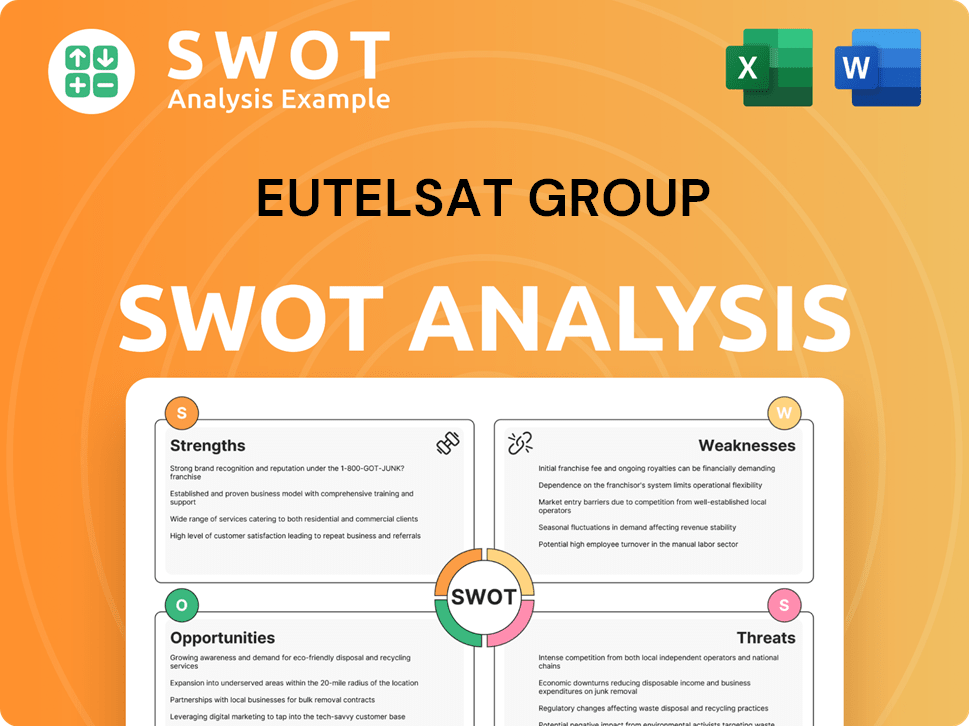
How Does Eutelsat Group Invest in Innovation?
The innovation and technology strategy of Eutelsat Group is pivotal to its sustained growth within the satellite communications sector. This strategy emphasizes leveraging cutting-edge advancements and strategic collaborations to enhance its service offerings and expand its market presence. The company's focus on technological advancements is evident in its significant investments in research and development, aimed at improving bandwidth efficiency and overall service quality.
A key aspect of Eutelsat Group's growth strategy involves the integration of various satellite technologies and the development of new services. The merger with OneWeb in September 2023 marked a significant milestone, creating the first fully integrated GEO-LEO satellite operator. This integration enables Eutelsat to offer resilient hybrid global and regional services, addressing connectivity challenges in remote locations and opening up new application possibilities.
Eutelsat's commitment to innovation extends to its participation in collaborative projects and its focus on sustainable practices. The company is actively involved in developing next-generation satellite technologies and is committed to reducing its environmental footprint. These initiatives are designed to strengthen its position in the telecom industry and drive future growth.
Eutelsat Group allocates approximately €200 million annually to research and development. These investments support improvements in bandwidth efficiency and service quality, driving technological advancements within the company.
The merger with OneWeb created the first fully integrated GEO-LEO satellite operator. This integration allows Eutelsat to offer hybrid global and regional services, enhancing its ability to serve diverse customer needs.
Eutelsat participates in the IRIS² constellation project, which aims to develop a European sovereign space connectivity capacity. This collaboration benefits from shared fixed costs and R&D investments.
Eutelsat's focus on connectivity solutions, particularly LEO-enabled services, has driven double-digit growth in its connectivity business unit. This highlights the success of its strategic initiatives.
Eutelsat has set targets to reduce CO2 emissions by 25% by 2025 and achieve 100% renewable energy in operations by 2030. These goals reflect the company's commitment to environmental sustainability.
In February 2025, Eutelsat Group fulfilled its Partner2Connect Digital Coalition pledge, connecting one million underserved people in Sub-Saharan Africa to reliable satellite broadband two years ahead of schedule.
Eutelsat Group's strategic initiatives are designed to strengthen its position in the Target Market of Eutelsat Group and drive long-term growth. The company's focus on technological advancements, strategic partnerships, and sustainability efforts positions it well to capitalize on future opportunities in the space technology and telecom industry. These efforts are crucial for achieving sustained financial performance and market share growth.
Eutelsat's technological advancements are central to its growth strategy, focusing on innovation and strategic collaborations to enhance its service offerings and expand its market presence.
- Integration of GEO-LEO Satellites: The merger with OneWeb allows Eutelsat to offer hybrid services.
- R&D Investments: Approximately €200 million annually is allocated to R&D, improving bandwidth efficiency.
- IRIS² Participation: Involvement in the IRIS² project supports European space connectivity independence.
- Connectivity Solutions: Focus on LEO-enabled services drives double-digit growth in the connectivity business.
- Sustainability Initiatives: Targets include reducing CO2 emissions and using renewable energy.
Eutelsat Group PESTLE Analysis
- Covers All 6 PESTLE Categories
- No Research Needed – Save Hours of Work
- Built by Experts, Trusted by Consultants
- Instant Download, Ready to Use
- 100% Editable, Fully Customizable
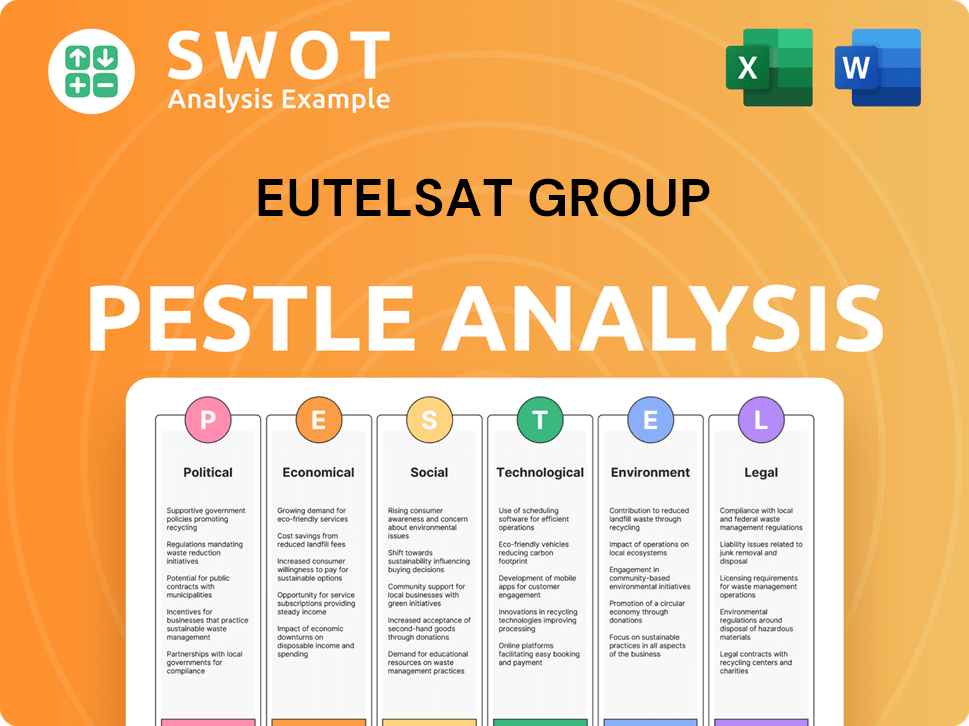
What Is Eutelsat Group’s Growth Forecast?
The financial outlook for Eutelsat Group in fiscal year 2024-25 reflects a period of transition, with notable shifts in its revenue streams. The company is navigating a landscape where growth in connectivity services is counterbalancing declines in traditional video services. This dynamic is reshaping the company's financial performance and strategic priorities within the telecom industry.
For the first half of fiscal year 2024-25, ending December 31, 2024, Eutelsat Group reported total revenues of €606.2 million, marking a 5.9% increase on a reported basis. Operating vertical revenues reached €599.9 million, up 3.9% like-for-like. This growth was primarily fueled by strong performance in connectivity, which more than offset the decrease in video services. The company's strategic initiatives are focused on capitalizing on the expansion of its connectivity services.
Connectivity revenues for the first half of FY 2024-25 were €290.7 million, up 21.1% on a reported basis, indicating a strong demand and expansion in this segment. This growth is a key factor in Eutelsat's overall financial strategy. Eutelsat's future prospects are closely tied to its ability to sustain and expand its presence in the satellite communications market.
Eutelsat has confirmed its financial objectives for the full fiscal year 2024-25. The company anticipates operating vertical revenues to remain around the same level as FY 2023-24. This stability is a key indicator of the company's ability to manage its revenue streams effectively.
The company expects an Adjusted EBITDA margin slightly below the FY 2023-24 level. This indicates a focus on maintaining profitability in the face of changing market dynamics. The Adjusted EBITDA for H1 FY 2024-25 was €334.9 million, resulting in an Adjusted EBITDA margin of 55.2%.
Eutelsat's gross capital expenditure for FY 2024-25 is now expected to be lower, in the range of €500-600 million. This reduction reflects a strategic shift in investment priorities. This is approximately €200 million less than previous estimates.
Eutelsat's backlog, a key indicator of future revenue, stood at €3.7 billion on December 31, 2024, equivalent to 3.1 times FY 2023-24 revenues. By March 31, 2025, the backlog was at €3.6 billion. This represents approximately 3.0 years of FY 2024 revenues.
The company's net debt stood at €2,695.8 million on December 31, 2024, with a net debt to Adjusted EBITDA ratio of 3.92 times. Eutelsat is actively working on a financing plan to support its strategic roadmap. The company aims to target a leverage ratio of approximately 3x in the medium term. A key element of Eutelsat's financial strategy involves managing its debt and investment in new technologies.
- The company faces significant investment requirements for its LEO constellation extension and the IRIS² project.
- Eutelsat expects to generate at least €6.5 billion in revenues from the IRIS² concession over its period.
- The shift towards connectivity segments is evident, with these segments now accounting for 57% of the total backlog.
- For more insights, explore the Competitors Landscape of Eutelsat Group.
Eutelsat Group Business Model Canvas
- Complete 9-Block Business Model Canvas
- Effortlessly Communicate Your Business Strategy
- Investor-Ready BMC Format
- 100% Editable and Customizable
- Clear and Structured Layout
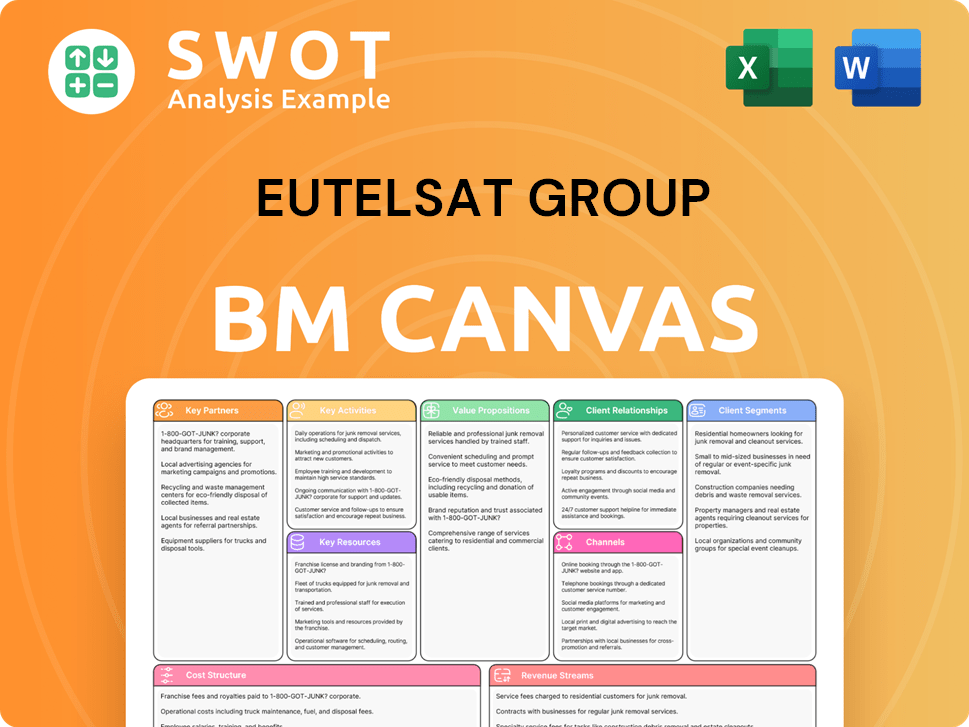
What Risks Could Slow Eutelsat Group’s Growth?
The growth strategy of the Eutelsat Group faces significant challenges due to intense competition and evolving market dynamics. The company's strategic and operational risks are primarily rooted in the satellite communications sector, demanding substantial investment and adaptation to new technologies. These factors are critical for understanding the future of Eutelsat and its ability to navigate the complex telecom industry landscape.
A key aspect of Eutelsat's future prospects involves managing a declining traditional video segment while simultaneously expanding into connectivity services. The company must also navigate financial constraints, including high debt levels and the need for capital expenditure. Furthermore, geopolitical factors and the evolving regulatory environment add to the complexity of Eutelsat's operational environment, influencing revenue streams and strategic decisions.
Eutelsat's ability to adapt to these challenges will determine its long-term success. This includes its ability to compete with new entrants in the space technology sector. Understanding these risks is essential for investors and stakeholders evaluating the company's strategic direction and financial health. For more context, you can read a Brief History of Eutelsat Group.
The primary risk for Eutelsat Group stems from increased competition in the satellite communications market. Low Earth Orbit (LEO) competitors such as Starlink and the upcoming Amazon Kuiper, expected in 2025, are major threats. These companies offer faster speeds and lower latency, putting pressure on Eutelsat's broadband services.
Eutelsat's traditional video segment is in decline due to the rise of Over-The-Top (OTT) media services. Video revenue decreased by 6.4% year-on-year in Q3 FY 2024-25. This decline affects earnings predictability and necessitates strategic shifts to other revenue streams.
Eutelsat carries a substantial net debt of €2,695.8 million as of December 31, 2024. Significant capital expenditures are required to expand its LEO constellation, estimated at €2-2.2 billion between FY 2024-25 and FY 2028-29. Rising interest rates and declining cash flows from traditional video services exacerbate financial concerns.
Geopolitical tensions pose risks, impacting revenue from regions like Russia. EU Regulation 269/2014 has led to the removal of certain channels since March 2025, impacting Eutelsat's revenues by approximately €16 million annually. These regulatory changes and political instability can significantly affect operations.
The uncertainty in executing LEO partnerships and the industry shift to LEO remain key investor concerns. The success of Eutelsat's strategic initiatives, including diversification into connectivity services and participation in projects like IRIS², is crucial. The company's ability to execute its plans will greatly influence its future.
Eutelsat operates within a constantly evolving regulatory framework. Changes in regulations can impact the company's ability to provide services and generate revenue. Compliance costs and the need to adapt to new rules are ongoing challenges that require strategic planning.
Eutelsat is diversifying into connectivity services and participating in projects like IRIS² to mitigate risks. IRIS² offers significant public funding and commitments for capacity, providing a strategic advantage. These initiatives aim to balance the decline in video revenue and increase revenue from other sources.
The company is actively working on a financing plan to align with its strategic roadmap and long-term leverage objectives. This includes managing its debt and securing funding for future investments. The financial strategy is essential to support the expansion plans and ensure long-term financial stability.
The competitive landscape is intensifying, with LEO constellations posing a significant threat to Eutelsat's market share. S&P Global Ratings revised Eutelsat's business risk profile to 'weak' from 'fair' in December 2024, reflecting increased uncertainties. The company must compete effectively to retain and grow its customer base.
Significant capital expenditures are needed to expand the LEO constellation. Analysts have expressed concerns about the company’s ability to service its debt, especially with rising interest rates. The company faces challenges in securing the necessary funding for its expansion plans.
Eutelsat Group Porter's Five Forces Analysis
- Covers All 5 Competitive Forces in Detail
- Structured for Consultants, Students, and Founders
- 100% Editable in Microsoft Word & Excel
- Instant Digital Download – Use Immediately
- Compatible with Mac & PC – Fully Unlocked
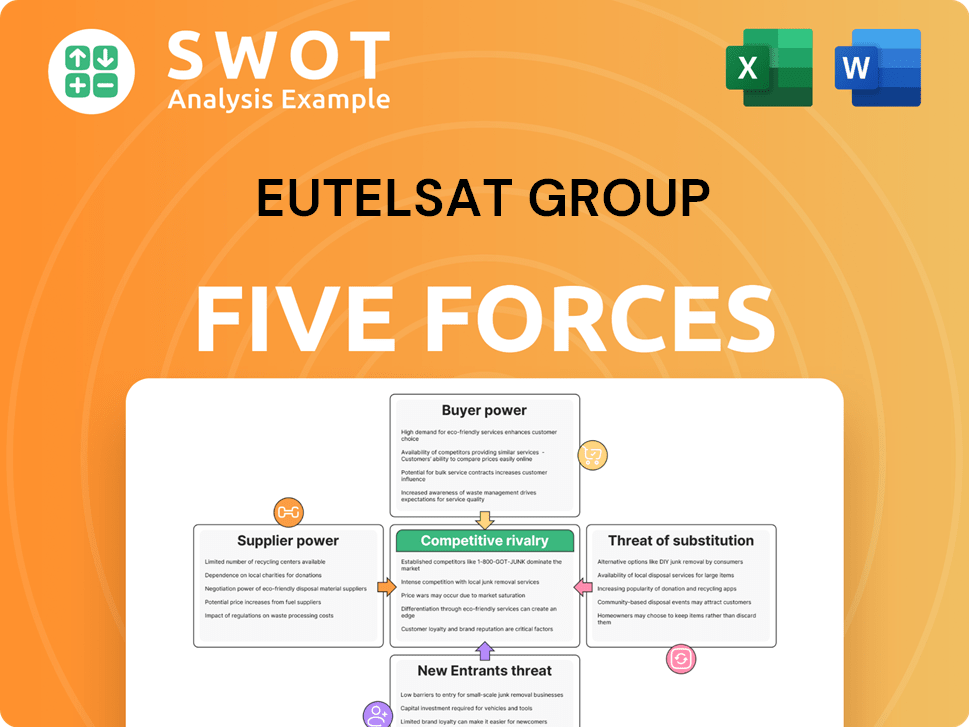
Related Blogs
- What are Mission Vision & Core Values of Eutelsat Group Company?
- What is Competitive Landscape of Eutelsat Group Company?
- How Does Eutelsat Group Company Work?
- What is Sales and Marketing Strategy of Eutelsat Group Company?
- What is Brief History of Eutelsat Group Company?
- Who Owns Eutelsat Group Company?
- What is Customer Demographics and Target Market of Eutelsat Group Company?
Disclaimer
All information, articles, and product details provided on this website are for general informational and educational purposes only. We do not claim any ownership over, nor do we intend to infringe upon, any trademarks, copyrights, logos, brand names, or other intellectual property mentioned or depicted on this site. Such intellectual property remains the property of its respective owners, and any references here are made solely for identification or informational purposes, without implying any affiliation, endorsement, or partnership.
We make no representations or warranties, express or implied, regarding the accuracy, completeness, or suitability of any content or products presented. Nothing on this website should be construed as legal, tax, investment, financial, medical, or other professional advice. In addition, no part of this site—including articles or product references—constitutes a solicitation, recommendation, endorsement, advertisement, or offer to buy or sell any securities, franchises, or other financial instruments, particularly in jurisdictions where such activity would be unlawful.
All content is of a general nature and may not address the specific circumstances of any individual or entity. It is not a substitute for professional advice or services. Any actions you take based on the information provided here are strictly at your own risk. You accept full responsibility for any decisions or outcomes arising from your use of this website and agree to release us from any liability in connection with your use of, or reliance upon, the content or products found herein.